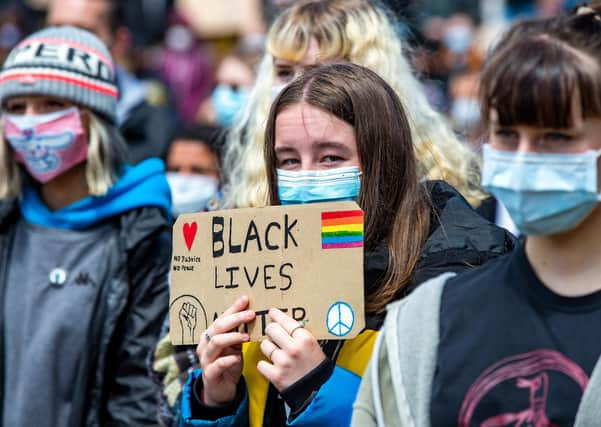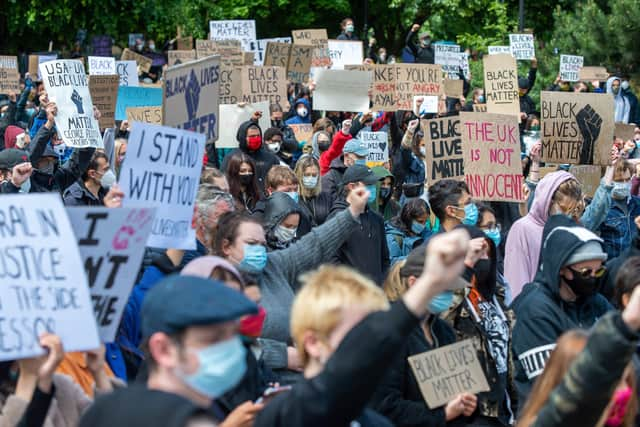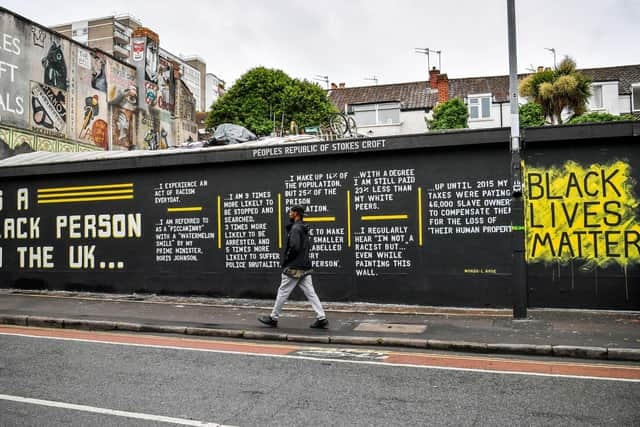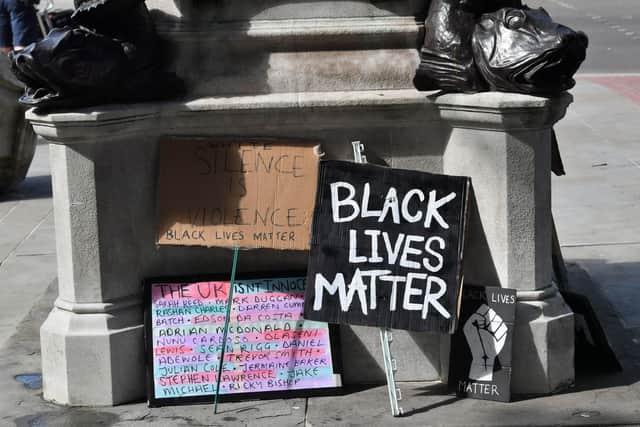Our greatest divide isn’t race: it’s social inequality – Jayne Dowle


And almost all of them swerve the elephant in the room. The great divider in the UK is not race, but class.
While racial prejudice cannot be ignored – or tolerated – the upswell of support in defence of George Floyd has its roots in a wider and deeper disaffection.
Advertisement
Hide AdAdvertisement
Hide AdQuite rightly, questions have been asked. Why should people in the UK care about a man killed by a police officer the US? Why should such a sense of injustice still resound so loudly two weeks after the killing?


If you are from an ethnic minority background yourself, those questions are likely to be easy to answer. If you’re not, then your response will depend on your household income, your employment status, the tenure of your home and how many GCSEs, A-levels and degrees you hold.
George Floyd’s death has highlighted crude divisions across the developed world. With 10 years of punitive government policies and a national history less than glorious when it comes to social equality, it brings our own uncomfortable truth into sharp focus.
Ask a young white working class teenager living in a rotting flat in the middle of any Northern town or city if they feel they have more in common with their ‘‘brother’’ or ‘‘sister’’ in Minneapolis than with their university-attending, middle-class counterpart in Surrey or Berkshire. What do you think their answer would be?
Advertisement
Hide AdAdvertisement
Hide AdThere is that same sense of looking in through a window at a world which is not meant for you. I’ve seen it in the resigned eyes and heard it in the quiet voices of young people at my daughter’s academy school.


That idea that social mobility, further education, a decent job and the opportunity to travel and explore the world is “not for the likes of us” makes me so sad. I remember it myself, clearly, walking home from school up the cobbled back street and wondering how other people lived. Back then, we had hope. And idealism. Now what do our children have?
Millions of people grow up never gaining the confidence to smash that window. If doesn’t matter if you are black or white; to be born less than privileged in the UK means your life chances are hobbled. Ministers talk a good game about ‘‘levelling up’’, but do they have a clue how uneven the playing field really is?
This is especially pertinent in the North of England. In January, a poll by the Social Mobility Commission found stark regional differences in people’s perceptions of their life prospects.
Advertisement
Hide AdAdvertisement
Hide AdJust under a third of people here said they felt they had a good chance to get on in life in their own region, compared with 74 per cent of those in the South East and 78 per cent of Londoners.


That’s one of the major reasons why, in the pouring rain last Sunday, so many people joined their voices in protest outside the Town Hall in Barnsley, South Yorkshire, 3,884 miles away from Minneapolis (I checked).
Predictably, out came the keyboard warriors who questioned why Barnsley folk should care about the death of a man on the other side of the Atlantic. This kind of tunnel vision rules out the bigger picture.
Overt (and erroneous) comparisons were made to Lee Rigby, the British soldier hacked to death by fundamentalists in 2013. Vicious comments about race, too vile to repeat, actually underlined the very justification of Black Lives Matter; that in so many spheres, racism is entrenched in the UK.
Advertisement
Hide AdAdvertisement
Hide AdAnd still that unease hung in the air like the thunderous clouds above. People are joining their voices to the Black Lives Matter protests because it is an outlet for their own anger, frustration and powerlessness.
That’s because the coronavirus crisis is showing up every crack and chasm in society and no more so in the ‘‘Red Wall’’ former Labour constituencies the Tories won in last December’s election.
If George Floyd had died in ‘‘normal’’ times, would the echoes have travelled quite so loudly across the Atlantic? Perhaps they may not have been as vitriolic, especially towards authority figures such as the police. And statues of long-dead colonialists.
However, the violent actions of a few should not distract from the conviction of the many. Writing in The Yorkshire Post this week, Barnsley Council leader, Sir Steve Houghton, warned that the health and unemployment impacts of the pandemic “have not been spread evenly”.
Advertisement
Hide AdAdvertisement
Hide AdIn Barnsley, the life expectancy difference between the wealthiest and poorest wards is already a shocking nine years. This is just one town. Now imagine this across the North of England, the Midlands and less-than-favoured parts of the South West and Wales. And then we ask ourselves why so many people feel that their own lives don’t matter.
Editor’s note: first and foremost - and rarely have I written down these words with more sincerity - I hope this finds you well.
Almost certainly you are here because you value the quality and the integrity of the journalism produced by The Yorkshire Post’s journalists - almost all of which live alongside you in Yorkshire, spending the wages they earn with Yorkshire businesses - who last year took this title to the industry watchdog’s Most Trusted Newspaper in Britain accolade.
And that is why I must make an urgent request of you: as advertising revenue declines, your support becomes evermore crucial to the maintenance of the journalistic standards expected of The Yorkshire Post. If you can, safely, please buy a paper or take up a subscription. We want to continue to make you proud of Yorkshire’s National Newspaper but we are going to need your help.
Advertisement
Hide AdAdvertisement
Hide AdPostal subscription copies can be ordered by calling 0330 4030066 or by emailing [email protected]. Vouchers, to be exchanged at retail sales outlets - our newsagents need you, too - can be subscribed to by contacting subscriptions on 0330 1235950 or by visiting www.localsubsplus.co.uk where you should select The Yorkshire Post from the list of titles available.
If you want to help right now, download our tablet app from the App / Play Stores. Every contribution you make helps to provide this county with the best regional journalism in the country.
Sincerely. Thank you.
James Mitchinson
Editor
Comment Guidelines
National World encourages reader discussion on our stories. User feedback, insights and back-and-forth exchanges add a rich layer of context to reporting. Please review our Community Guidelines before commenting.